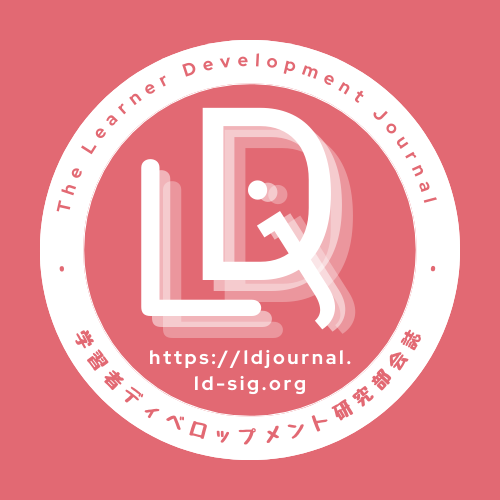
February 2024
日本語版は下にあります。Japanese follows English.
The Learner Development Journal (LDJ) seeks to publish new research on questions and puzzles about learner development in context, as well as reviews or recent work and interviews with other researchers and practitioners in the field of learner development.
Each issue of the LDJ is on a special theme with a Call for Proposals going out about 18 months before expected publication.
Developing Your Research and Writing
A major principle of the LDJ is exploratory and collaborative research and writing within a Community of Practices approach. Contributors come together under the leadership of the co-editors to share their proposals, research interests and plans with each other, and discuss and respond to each other’s research and writing as it develops. Later contributors exchange incomplete drafts of their writing, respond to each other’s writing, and develop their writing further. Authors also get feedback from members of the LDJ Review Network (here authors can choose open or blind review), as well as from the issue editors, as their work moves towards completion.
As you develop your writing, you will be asked to keep these questions in mind:
1. Interest: Do you catch the reader’s interest?
2. Audience: Do you address peers (teacher-researchers and researchers) interested in learner development issues?
3. Context: How can you create a clear picture of particular learners or particular groups of learners with reference to the learner development issue(s) that you wish to focus on?
4. Voice: How can you communicate to the reader your own sense of “voice”? How can you include other voices (e.g., learners, colleagues, cited work) about the issue(s) you wish to explore?
5. Problematising stance: In what ways can you raise interesting and relevant questions about the issue(s) you wish to focus on, without being descriptive and distant?
6. Specific and clear focus: How can you develop a specific focus of inquiry, and how can you address and explore this with clarity throughout?
7. Reflective sense of learning: How can you construct and reflect on a process of your own learning, as well as that of the participants involved in the research about the issue(s) that is/are focused on?
8. Multi-perspectives: Can you examine the question(s)/ puzzle(s) /issue(s) that you wish to focus on from alternative perspectives, rather than from (a single) conventional viewpoint(s)?
9. Knots: Can you avoid easy answers and try to unravel knots that the writer encounters in the practice, theory, and inquiry?
10. Criticality: By the end, has your paper drawn out key issues, re-framed these, and raised new questions for the reader to take away and consider?
Finalising Your Writing for Publication
We encourage writers to write in an “I” voice and to ground your research in your practices. The final versions of your articles will be 5,000 and 8,000 words, excluding References and Appendices. Other genres of writing will vary in length and be negotiated case by case.
For in-text citations and references, the LDJ follows the APA style of formatting. As you finalise your writing, it helps to be familiar with basic APA referencing guidelines as explained in the 7th edition of the APA Publication Manual (2020).
From LDJ6 onwards the LDJ is assigning a DOI to each text published in an issue of the LDJ. This means that you will need to provide DOIs for every reference in your reference list (unless the work in question does not have a DOI). This webpage provides an APA explanation about DOIs. To check whether a publication has been assigned a DOI or not, use the “Search Metadata” option on this webpage: https://www.crossref.org.
You will need to provide an abstract and keywords for your writing in English and Japanese (the editors can help find a Japanese translator where needed). You will also be requested to provide a short bio of 75 words and your email contact details.
Final drafts will need to include:
- Title
- Author(s)
- Affiliation(s) & contact email address
- Abstract in English
- Abstract in Japanese
- Keywords in English
- Keywords in Japanese
- Text (can be multimodal)
- Author bio(s)
- References (following the 7th edition of the APA Publication Manual, 2020).
Other features such as an abstract and keywords in a third language other than English and Japanese may be required for particular issues of the LDJ.
執筆者へのガイドライン
2024年2月
学習者ディベロップメント研究部会誌(LDJ)は、学習者ディベロップメントの分野における研究者や実践者へのインタビューやレビュー、最新の研究だけでなく、学習者ディベロップメントに関する疑問や課題の新たな研究を掲載することを目的としています。
LDJの各号には特集テーマがあり、出版予定日の約1年半前に提案募集が行われます。
研究と執筆の発展に向けて
LDJの主な原則は、実践共同体のアプローチにおける、探索的かつ共同的な研究と執筆です。執筆者は共同編集者のリーダーシップのもと、提案書や研究上の関心、計画を共有し、互いの研究や執筆が進展する度に議論し合います。その後、執筆者たちは投稿論文の原稿を交換し、互いの執筆物をさらに発展させるためにコメントをし合います。また執筆者は、LDJ査読ネットワークのメンバー(ここではオープン査読とブラインド査読を選択できます)や編集者からフィードバックを受けながら、投稿論文の完成を目指します。
以下の文は執筆者に向けて、執筆プロセス中に考慮すべき質問や指針を示しています:
- 興味:読者の興味をつかんでいますか?
- 対象読者:学習者ディベロップメントの発展に関する課題に興味を持つピア(教師研究者や研究者)に対応していますか?
- 文脈:あなたが焦点を当てたい学習者ディベロップメントにまつわる諸問題を念頭におきつつ、具体的な学修者像を描いていますか?
- 声:読者に自分自身の「声」をどのように伝えることができますか? あなたが探求したいテーマについてどのように他者の声(例:学習者、同僚、参考文献)を反映させることができますか?
- 問題化の立場:記述的で隔たりのある表現にならずに、どのようにして焦点を当てたいテーマについて興味深く関連性のある質問を立てることができますか?
- 具体的かつ明確な焦点:どのようにして特定の研究対象への調査を発展させ、それを全体を通して明確に探求させることができますか?
- 学びの反省的意識:あなた自身の学習プロセスと、焦点を当てたテーマに関与する参加者の学習プロセスをどのように構築し、反映させますか?
- 多角的な視点:(単一的な)従来の視点からではなく、新たな視点から焦点を当てたい質問や、謎、問題を検証できますか?
- ノット:簡単な答えを避け、執筆者が実践、理論、調査において遭遇する複雑さを解明しようとできますか?
- 批判的視点: 最終的にあなたの投稿論文は、重要な課題を浮かび上がらせ、これらを再構築し、読者に新たな質問を提起していますか?
出版に向けた執筆の最終確
私たちは執筆者に対して、研究を自身の実践に基づくことと、“I” の声で書くことを奨励しています。投稿論文の最終稿は、参考文献と付録を除いて5,000〜8,000語になります。他の執筆ジャンルは長さが異なり、個別に調整されます。 本文の引用と参考文献については、APA形式のフォーマットに従います。最終執筆を行う際に、2020年出版のAPA論文作成マニュアル(第7版)で説明されている基本的なAPAでのガイドラインに精通していると役に立ちます。 LDJ6以降、LDJの各号に掲載される投稿論文にDOIを割り当てています。これは、参考文献すべてにDOIを記載する必要があることを意味します(ただし、該当する作品にDOIがない場合を除く)。このウェブページからDOIに関して確認できます。出版物にDOIが割り当てられているか確認するには、以下のウェブページの「メタデータ検索」オプションを使用してください:https://www.crossref.org。執筆の際、英語と日本語の要旨とキーワードを提供する必要があります(必要に応じて翻訳者を手配することができます)。また、75語の自己紹介と問い合わせのための電子メールアドレスも記載してください。 最終稿には次の内容が含まれる必要があります:
- タイトル
- 著者名
- 所属先および連絡先メールアドレス
- 英語での要旨
- 日本語での要旨
- 英語でのキーワード
- 日本語でのキーワード
- テキスト(マルチモーダルでも可)
- 著者の自己紹介
- 参考文献(APA論文作成マニュアル(第7版)、2020に従う)
LDJの特集号によって、英語と日本語以外の第三言語での要旨とキーワード等、その他が必要な場合があります。